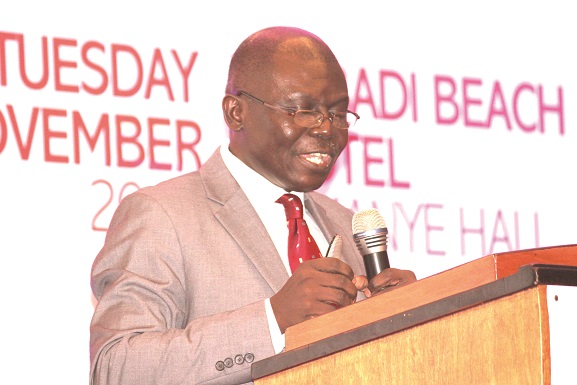The Director of the Institute of Statistical, Social and Economic Research (ISSER), Professor Felix Asante, has advised the government to tread cautiously on the introduction of taxes in the country.
He explained that too many taxes could be counterproductive because “they have diverse implications on the survival of businesses.”
At the Graphic Business/Stanbic Bank Breakfast Series on the topic: “Election Year Budget Deficit: Implications for Macro-Economic Stability, Prof. Asante said it was not strategic for the country to overburden its businesses with high taxes.
Criticisms of new tax
The government has come under criticisms lately from business concerns for its excessive tax policies after the introduction of the new income tax, (Act 896, 2015), in January this year.
The Association of Ghana Industries (AGI) identified excessive taxes as one of the main problems hindering the progress of its members in its 2016 Business Barometer Report for the first quarter.
The Integrated Social Development Centre and the Consumer Protection Agency also blamed sharp spikes in electricity prices as a consequence of high taxes imposed on the cost of power.
The Chartered Institute of Taxation Ghana (CITG) has backed calls for the suspension of the new Income Tax Act, 2015 (Act 896), describing portions of the law as a mockery of the international guidelines on taxation.
Beyond being counterproductive, the institute said the government's desire to mobilise more revenue through taxes caused it to overlook pertinent regulations on taxation during the formulation of the Act; hence, the need to suspend its implementation until such flaws were addressed.
It mentioned the introduction of the one per cent windfall tax on companies enjoying tax holidays, the adjustments made to the capital gains and withholding taxes and the new 10 per cent withholding tax on the purchase of unprocessed minerals as some of the provisions that were counter-productive and contrary to the general regulations on taxes.
Woes of the private sector
Prof. Asante also credited the woes of the private sector to the uncertainty in inflation and other related macro-economic variables in the country, explaining that such conditions make it difficult for businesses in the country to plan.
“The high dependency on import makes the volatility in the exchange rate market impacts directly on inflation, when debt service to domestic revenue and export is high and coupled with volatile exchange rate inflation cannot be stable,” he said.
Records from the Ghana Statistical Service (GSS) show that from 17.7 per cent in December 2015, inflation jumped to 19.0 per cent in January 2016, slipping to 18.5 per cent in February.
It rose to 19.2 per cent in March, slid again to 18.7 per cent in April, inched up to 18.9 per cent in May and dropped to 18.4 in June.
In July, it declined to 16.7 per cent, followed by an upward adjustment to 16.9 in August and 17.2 percent in September 2016.
But end-of-year inflation rate in 2015 was 17.7 per cent compared to 17.0 per cent in 2014, 13.5 per cent in 2013 and 8.8 per cent in 2012.
This outturn far exceeds the 2015 targeted rate of 13.7 per cent.
The average annual inflation rate also rose from 15.5 per cent 15.5 per cent in 2014 to 17.1 per cent 2015.
However, broad money supply, including foreign currency deposits (M2+), grew by 26.1 per cent last year compared to 36.8 per cent in 2014 and 28.8 per cent in 2013.
Thus, the reduced growth of money supply failed to hold inflation overall to the targeted level last year.
Prof. Asante noted that between 2015 and 2015, interest rates for depositors all decreased except for time deposits, while lending rates also increased.
“Such an outcome likely reflects the higher risk premium associated with relatively long-term investment activities. The cedi depreciated by 28.2 per cent and 23.3 per cent based on the interbank and forex bureau rates respectively,” he cited.
Breakfast meeting
The breakfast meeting, which is an initiative of the Graphic Communications Group and the bank, is a series of dialogues that feature selected topics and is aimed at influencing government policies in favour of businesses.
The meeting was chaired by Mr Kweku Awotwi, Board Chairman, Stanbic Bank. Other speakers were Professor Felix Asante, Director of the Institute of Statistical, Social and Economic Research (ISSER) of the University of Ghana; Mr Seth Terkper, the Minister of Finance, and Mr Alhassan Andani, the Managing Director of the Stanbic Bank. — GB
